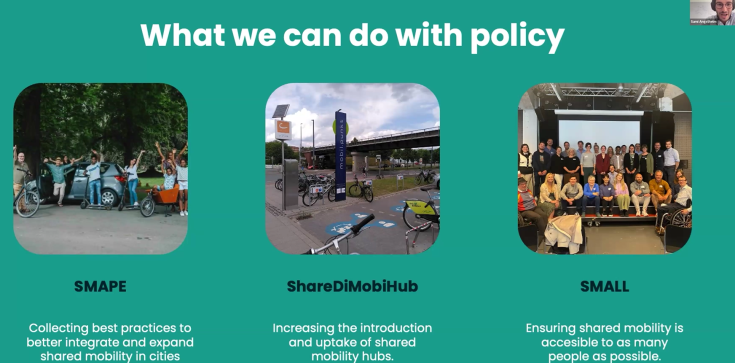Webinar- SMAPE gathers projects to discuss shared mobility

On June 25, 2024, SMAPE hosted a webinar, "Enhancing Shared Mobility: Innovative and Inclusive Policies and Tools," drawing participants from across Europe. Organized with the support of project partner POLIS Network, the event aimed to share insights and foster discussions on regulatory frameworks for shared mobility.
As shared mobility has grown over the past decade, offering sustainable and flexible transportation options that can reduce traffic congestion, lower emissions, and enhance urban mobility. Although this expansion of shared mobility services, including car-sharing, bike-sharing, and e-scooter programs, has also presented new challenges with its rapid increase, some other authorities still are taking slower steps to figure out how to deploy a reliable service working for every citizen's needs. Cities and regions grappled with issues such as improperly parked vehicles, safety concerns, and the need for equitable access. To address these challenges, robust regulatory frameworks are essential.
These frameworks help ensure that shared mobility services are integrated effectively into urban transport systems, providing benefits to the public while maintaining the viability of service providers. By setting clear guidelines, standards, and incentives, regulatory frameworks can foster a balanced and inclusive approach to shared mobility, contributing to more sustainable mobility policies.
Opening Remarks and Introduction
Sami Angsthelm, part of the Shared Mobility for all (SMALL) project and BAX & Company, moderated the session and opened the session by emphasizing the importance of developing balanced policies for shared mobility. He noted that shared mobility has boomed in recent years but has also led to challenges due to insufficient communication between operators and cities.
ShareDiMobiHub and agreements between authorities and operators
Bram Seeuws from Autodelen.net, part of the ShareDiMobihub project, provided a comprehensive overview of various regulatory frameworks that cities and regions can adopt to manage shared mobility services. He emphasized the importance of definitions, conditions, quality standards, and incentives in creating a balanced regulatory environment. Bram discussed different regulatory models ranging from open licensing systems to more controlled municipal programs. He explained how open licensing systems allow any eligible operator to receive a license, promoting diversity and competition. Conversely, more controlled systems, such as single-operator partnerships or municipal programs, involve the city more deeply in the management and operation of shared mobility services.
How to make shared mobility for all by looking at different cities
Daniel Herrera from POLIS Network presented the Shared Mobility for All (SMALL) project, which aims to make shared mobility more inclusive by addressing the needs of diverse user groups, including children, the elderly, and individuals with physical impairments. He highlighted the project's approach to co-creation, involving target groups in the design and development of shared mobility solutions. Daniel detailed various pilots being implemented across different cities. For instance, in Capital Region of Denmark, a shared mobility service is being piloted at a hospital to help patients complete the last mile of their journey using shared vehicles. The project's ultimate goal is to develop policy recommendations and best practices that ensure shared mobility services are accessible to all user groups by analysing a policy database from all over Europe.
Shared mobility in islands- how is North Aegean doing it with SMAPE
Maria Eleftheriadou from the Regional Development Fund of North Aegean Region discussed the unique challenges and opportunities in implementing shared mobility in the North Aegean region within the SMAPE project. The region consists of ten islands with varying levels of infrastructure and mobility needs. Eleftheriadou highlighted the project's efforts to introduce smart mobility applications, such as car-sharing, e-bikes, and e-scooters, to improve transportation options. She detailed the region's specific challenges, including seasonal mobility demand, poor road infrastructure, and the difficulty of transporting private vehicles on ferries. Maria discussed plans to create micro hubs on smaller islands to enhance tourism and reduce traffic congestion.
Conclusion
The webinar showcased the different realities of developing functioning frameworks that includes collaboration among stakeholders, paving the way for more innovative and inclusive shared mobility solutions. The insights and discussions from the event proved the critical role that well-crafted regulatory frameworks play in the successful integration of shared mobility services. These frameworks are essential for maintaining order, safety, and inclusivity, while also fostering an environment that encourages innovation and market growth.
